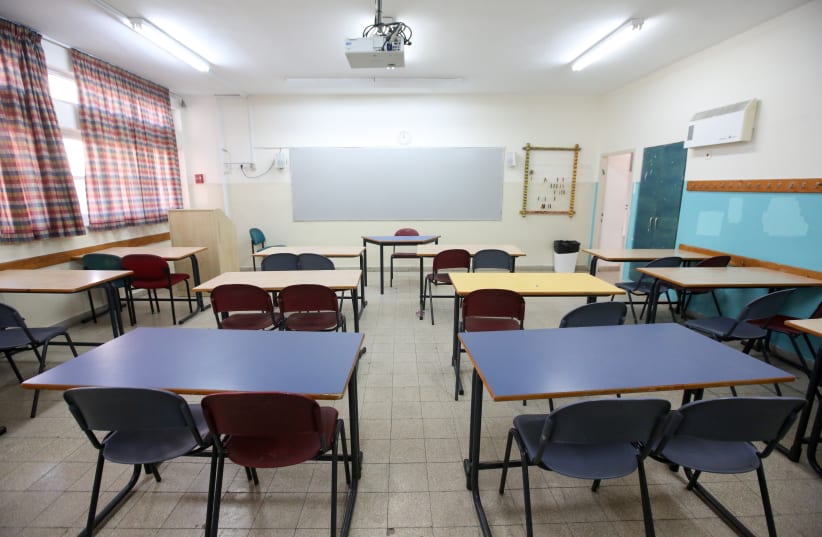The HILA teachers union warned that closing the program, which helps many at-risk youth, would risk leaving 8,000 students on the streets and leaving 1,600 teachers without jobs. HILA has been providing education services for students aged 14-18, who have dropped out of school, since the 1980's and functions in 120 municipalities. The program aims to prepare students for the bagrut matriculation tests or for a diploma.
The union warned that this was the largest, but not last act of protest by the teachers, students and graduates.
"The Education Minister insists on calling the HILA program 'complementary' education. Education that is 'separate' or 'different' from regular education. The meaning is that in his eyes, a dropout student is not a regular student. In the eyes of the Education Ministry, they are extras that can be given up on," said Telila Elon, a member of the HILA teachers' union."Tomorrow we will make absolutely clear: there is no such thing as complementary education: The Compulsory Education Law applies to everyone! A dropout youth deserves education just like a student. As of now, we only give education in Israel to the strong students."
The Education Ministry announced in July that the programs would be frozen due to the budget crisis and a lack of about NIS 4 billion needed for the programs. The ministry has stated that until a state budget is passed, it will not provide a budget for HILA.
A state budget may not be approved until as late as November if an extension to the deadline for the budget is approved by the Knesset.
Uri Yelovsky, a student in the HILA program, told the Knesset Special Committee for the Rights of the Child on Monday that he did not succeed in learning in a regular school, but that HILA had helped him succeed in completing his bagrut requirements.
"How am I different from a normal child studying in a normal setting?" asked Yelovsky. "Only I am being shut down. At the moment, I have nowhere to learn next year. I am fighting for my bagrut. Why can a regular student submit a bagrut and I can't? And I still have somewhere to go: what about children who will return to the streets?"
Many of the students in the program are at-risk youth or are there as an alternative to being arrested. Teachers in the program fight to keep these students within the education system and help them succeed in completing the bagrut requirements and graduating.
"As I found a door to a place of learning that understands me, to a home, the government wants to slam the door of that home closed on me and 8,000 of my friends, and to throw us on the streets," lamented Yossi Reese, a HILA student. "Don't let this happen: Come fight with us for our home."A number of MKs will speak at the protest on Wednesday, and teachers and students will talk about what the shuttering of the program will mean for them. HILA serves as the last resort for dropout students in Israel.
Community Empowerment and Advancement Minister Orly Levy-Abecassis tweeted on Sunday that she had presented a plan to save programs for at-risk youth, especially HILA and the Karev Program. The minister explained that the teachers in the program would go on unpaid leave and receive unemployment benefits that would cost the same as just continuing to run the program in the first place.
In a letter signed by all mayors in the country, Chaim Bibas, chairman of the Federation of Local Authorities in Israel and mayor of Modi'in-Maccabim-Reut, warned on Tuesday that if the Finance Ministry does not approve a budget for afternoon child care and additional classes and programs for at-risk youth, the school year will not begin on September 1.
"The Finance Ministry is not transferring funds and continues to bury its head in the sand. It thwarts our efforts to open the school year and give the public a real response," wrote Bibas, stressing that if the budget is not approved, "We say in a clear voice – the school year will not open."
Education Minister Yoav Galant has repeatedly stated that the school year will begin on September 1.
On Monday, Vered Windman, executive director of the Israel National Council for the Child, decried the move to shutter the educational programs, calling the Finance Ministry's behavior "delusional and detached from reality.""Instead of initiating new programs to deal with the difficult challenges of the period, meeting after meeting, more than 50 senior officials from the public sector and civil society are repeatedly forced to explain the critical importance of programs that are expected to close and fail to prevent the evil decree," added Windman, calling on Prime Minister Benjamin Netanyahu to "intervene today and ensure that the youth and children at risk, that they too will receive the care and assistance they are entitled to and need."The Darna-Safe Home for At-Risk Youth association filed a lawsuit to Israel's Supreme Court on Tuesday demanding that the Education Ministry be ordered to approve a suitable budget to prevent the closure of the HILA program.
The association told the court that not providing the budget would violate the rights provided by the Compulsory Education Law and harm the principle of equality of the program's participants.
Youth who are required to be in a boarding school are not able to study outside the school, and the cancellation of the HILA program will violate the basic right to a free, compulsory education and create further severe discrimination against them in comparison to their peers, stressed Darna.
